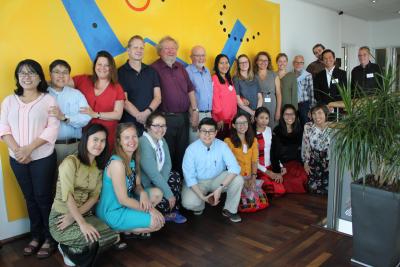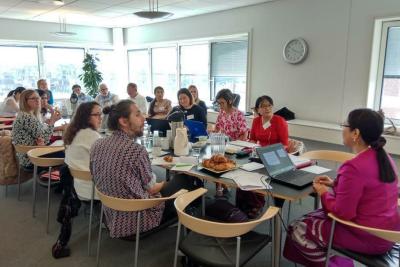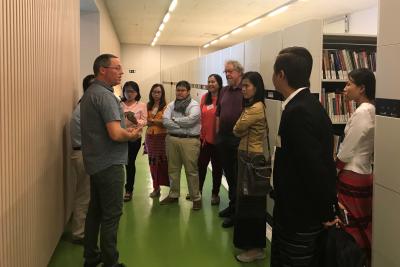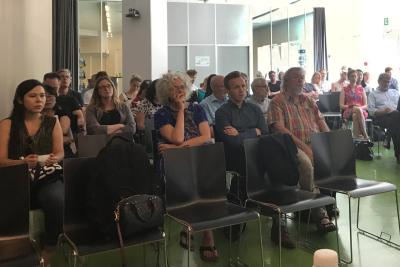Justice from the perspective of ordinary people in Myanmar
On 21 to 24 May DIIS hosted a major workshop and public seminars on everyday justice and transition in Myanmar with the attendance of eleven Myanmar researchers and several leading international scholars. The events marked a major step in the progress of the DIIS-coordinated EverJust research project (Everday Justice and Security in the Myanmar Transition), which since 2015 has done innovative and in-depth studies of how ordinary people in Myanmar experience (in)justices and resolve disputes and crimes. Looking into this topic, from an empirical perspective is rather unique to Myanmar studies, and contributes to shed light on larger political questions about peacebuilding, state-citizen relations, and socio-cultural diversity. This has included fieldwork in some of the most under-studied areas that have experienced decades of armed conflict and that are governed not by the central Myanmar state, but by ethnic armed organizations.

The EverJust project constitutes a partnership between DIIS, Aarhus University and two research institutions in Myanmar: the Anthropology department of Yangon University and the Enlightened Myanmar Research Foundation (EMReF). A core aim is to enhance international research collaboration and support social science research capacity in Myanmar, including library sources and trainings in research methods, theory and academic writing. Apart from producing strong empirical evidence that can feed into policy debates on justice and security in Myanmar, a very significant contribution of the project has been to enable Myanmar researchers to publish internationally.
The first major publication of the project appeared in early May 2018 as a special issue on Everyday Justice in the International Journal of Burmese scholarship. The workshop on 21 to 23 May centered on bringing a second round of papers towards a publication with NIAS press, Copenhagen. All attending researchers presented empirically rich papers on justice, disputes resolution, customary law, state-making and local politics across Yangon, Mon, Kachin and Karen states, as well as the Naga and Pa-O self-administered Zones. Invited discussants, among who were leading international scholars, provided constructive and provocative comments. A special thanks to Mark Duffield, Morten Pedersen and Ardeth Thawnghmung for their role as discussants, and to Gerarld Jackson from NIAS Press for his support of the research.

To deepen the project’s focus on institutional collaboration, the Myanmar researchers and supportive staff were also introduced to DIIS as an institution, including the DIIS library, communication department and finance staff. The workshop also allowed the visiting researchers to become familiar with the Danish justice system and the non-state spheres of governance and dispute resolution, through a presentation by former Ombudsman Hans Gammeltoft-Hansen and a study-tour to Christiania.

It is important that the EverJust research feeds into and helps inform policy debates and political changes in Myanmar. The academic publications are significant to achieve this objective, but it is also important that they are translated into more tangible recommendations. A core insight of the research is that ordinary citizens mistrust the official justice system and instead prefer to resolve disputes and crimes in informal ways at the most local level. There is a strong tendency to avoid, rather than engage the state. Conversely, the justice systems of the ethnic armed organizations and the dispute resolution forums of village and ward leaders are seen as legitimate and effective by most people. These forums are not however recognized by the Myanmar state, but tend to be ignored and even undermined in official policies. On 23 May, DIIS senior researcher Louise Riis Andersen spearheaded a debate on how these findings can inform policy changes and what role the international community can play in assisting such changes.

These policy discussions were continued on 24 May at a DIIS Public Seminar on “Fragile Peace and Transition in Myanmar”, featuring leading Myanmar experts. Taking local issues to the national political level, the experts discussed the prospects for peace, justice and democratization in Myanmar. A major message was that despite the coming into power of the National League for Democracy (NLD), headed by Aung San Suu Kyi, the country’s democratic future is facing major challenges, not least due to the continued armed clashes and atrocities against the country’s minorities. Faith must be placed with the younger generations and civil society organizations, who can push for changes from below. The livestreaming of the seminar can be found here.
On the same day EverJust hosted a public DIIS seminar with Yale Professor James C. Scott on public historical memories.
More information about the Everjust project can be found here: https://www.diis.dk/en/everjust
DIIS Experts


